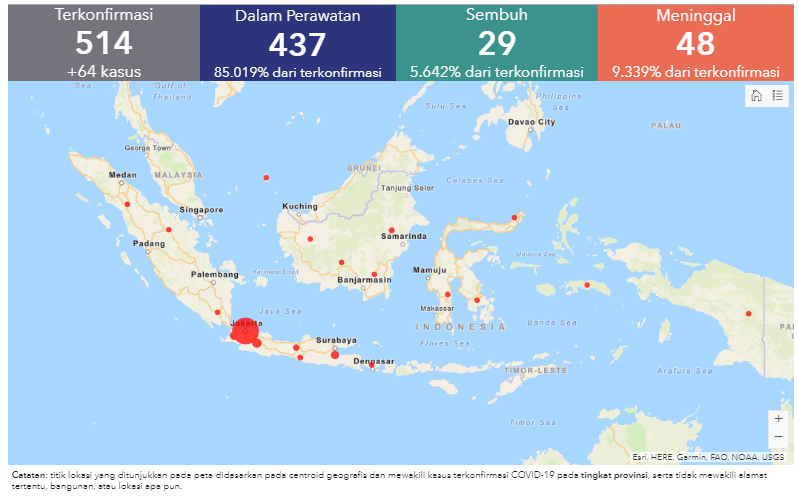The Impact of the Covid-19 Pandemic, Digital Transformation Is Not Just Jargon
Also discussing things that often make transformation efforts fail
Wednesday (18/3), the Head of the Shopping Center Tenants Association (Hippindo) Budihardjo Iduansjah conveyed to the media, daily turnover of the shop in template decreased by 50% -80% as the #StayAtHome movement was initiated to minimize the transmission of Covid-19. One of the efforts made by brand owners, he added, is that they rely on transactions from store branches in the area (outside Jabodetabek) – considering that many areas have not strictly enforced the recommendation not to leave the house.
Unfortunately, according to the latest data (23/3) at 12.00 WIB, there have been 514 cases spread across various regions in Indonesia. Several local governments have also advised their citizens to reduce activities outside the home. In Central Java, for example, schools have been closed for the past week. Some government offices, such as the Dukcapil Office, close several types services that are usually crowded with people, such as e-KTP data recording.
It is not impossible that shopping centers in the area will also experience a decrease in the number of visits. The point is, the solution that you are trying to rely on regarding business scalability may not work as expected – relying on branch stores in the region.

It's not only felt by big retail businessmen, in Blitar there are many SMEs that have start complaining. Most entrepreneurs produce snacks for souvenirs at tourist attractions such as to be marketed in Yogyakarta. Whereas before Eid, usually their production is increased to welcome the homecoming flow. But since February, they have been forced to put the brakes on their business. Chairman of the Association of Indonesian Tourism Industries (GIPI) Yogyakarta Bobby Ardyanto on Wednesday (11/3) sayThe impact of Covid-19 resulted in a 30%-50% decrease in the number of tourists.
Must want to transform
A solution is needed, because the trade sector is the second most contributing to the Indonesian economy. Until the first quarter of 2019, BPS still recorded growth of 5,26% (yoy). This business involves many parties, from big players to micro players at the home level. When a pandemic occurs, there are several aspects that can be considered to ensure the economic process continues to run well.
The first is sales, related to how retail owners facilitate their consumers with channels that facilitate the buying process. The second is logistics, not only related to the delivery of goods to consumers, but also in the supply chain of raw materials. As perceived by PT Sarimelati Kencana Tbk as the holder of the Pizza Hut franchise brand in Indonesia. Director Jeo Sasanto convey, now there is an increase in raw prices and supplies are starting to run low.
A digital approach can certainly provide a solution to these problems, but there must be a business will to transform. So often called for, many consider digital transformation as mere technology brand campaign jargon. Whereas more than that, transformation can be interpreted as an effort to accelerate business by involving technological tools. The process is not by replacing all manual business models with digital, but by trying to see opportunities that can help certain business processes with digital.
For example with the commercial business case study above. Transformation does not mean that businesses have to close their traditional retail units and replace them with a business-based approach E-commerce. Instead, technology can be used as a complement to enable businesses to embrace a wider target market. One of the strategies is to utilize online-to-offline, for example the brand still has a physical store to increase "presence" and shopping experience, while providing instant purchase access online for convenience.
These efforts will be very beneficial when businesses are forced to do "shift" due to an emergency. Instead of being quiet, for example the restaurant business, when “lockdown " because of the business pandemic, it can intensify the promotion of delivery services through the application online – which solves the two problems mentioned above at the same time, regarding sales channels and logistics. Supply chains can also start relying on the platform online which can even connect business people with raw material producers – call it an application TaniHub to get fresh vegetable products.

For SMEs with mediocre capital, then how to do it? What is noteworthy is that transforming does not always have to cost a fortune to spend on infrastructure and/or application services. Start with those that have the most impact on the business. Take the example of a food stall, you can start by registering the business and the menus in an application such as GrabFood, GoFood or Traveloka Eats. For other businesses, for example the one produced by UKM in Blitar above, start using social media and online marketplace to put a product catalog.
So is it enough to get there? Certainly not. Digital transformation requires commitment and tenacity. Simply put, online is a market, where there are many other merchants selling similar product variants. Just like in traditional markets, all traders need to do is offer their products to passers-by. In online, people can offer through social media, use discount promos, take advantage of paid advertising and so on.
The most challenging of transformation
Thus, there are four things that ideally a business will get, at least as a general measure of transformation results. Namely ensuring business remains competitive, bringing efficiency to business processes, increasing customer satisfaction and making it easier for businesses to make strategic decisions.
According to KPMG Singapore's Head of Enterprise Market Jonathan Ho, there are three challenges that most often complain about SMEs in adopting digital. The first is related to understanding the urgency of digital transformation itself. Digital transformation on the one hand is not just about technology, but more about how businesses can compete more intensively in the current developments. Business people often make the perception that digitalization is a matter of increasing operational costs, even though if applied on the contrary, technology reduces costs in many aspects.
The second is the lack of knowledge about digital skills that are relevant to business. The fact is that not all businesses need a website, some just need to promote through the appropriate channels. Lack of understanding often makes digital transformation decisions that are taken less in accordance with the needs of the business itself. Besides wasting time, maybe a lot of the investment that was disbursed will eventually be wasted. Sometimes all it takes is to start selling for free through the platform marketplace only.
And thirdly, business people sometimes feel "insecure" with the digital world. For example, they are afraid that later payments will be made smoothly – for example, some marketplace withhold payment until the product is actually in hand or force the business to use the service e-wallet integrated. Or other concerns, for example fear of being replicated by other people because they are widely published on social media. Indeed, all the bad possibilities can happen, but excessive skepticism sometimes actually keeps businesses from going anywhere, unwilling to transform.
So that the important point that cannot be missed from the effort to carry out the transformation is to correct the mindset of the businessman himself. In addition, the moment of the "disaster" of the Covid-19 pandemic is now an important lesson. That today's digital transformation is a necessity.
Sign up for our
newsletter
